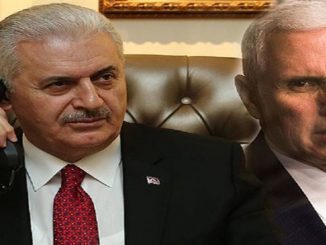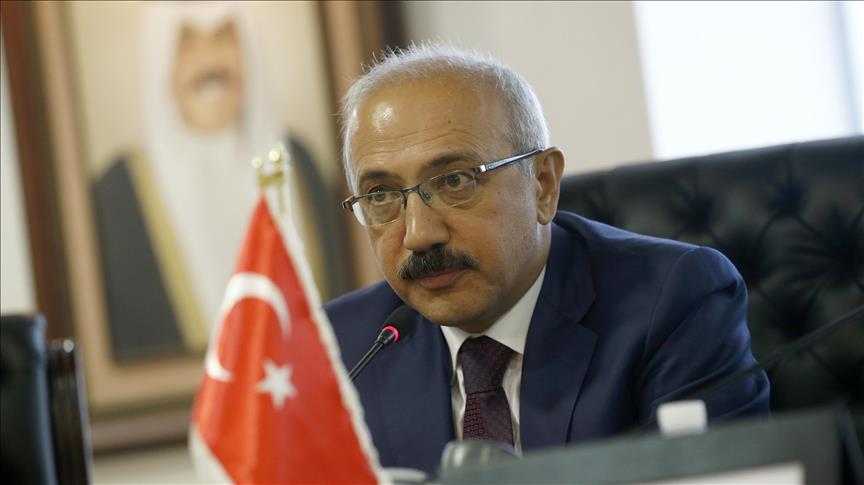![20160602_2_17233772_10896347_Web [187519] Turkey rejects refugees resettlement based on education level](https://middleeastobserver.org/wp-content/uploads/2016/06/20160602_2_17233772_10896347_Web-187519-1.jpg)
On the sidelines of a nuclear security summit in Washington in March, Turkish President Recep Tayyip Erdogan held a private meeting with Israeli Energy Minister Yuval Steinitz. It was the highest level contact between Israel and Turkey since diplomatic relations broke down six years ago after Israeli forces raided a Turkish ship bound for Gaza, killing 10 Turkish activists, Reuters reported.
The meeting, which lasted 20 to 30 minutes and whose details have not been previously disclosed, discussed the war in Syria, Iran’s presence there, terrorism – and natural gas. That last item is a key driver of efforts to forge a rapprochement between Israel and Turkey: At stake are reserves of natural gas worth hundreds of billions of dollars under the waters of Israel and Cyprus. To exploit them Israel will likely require the cooperation of Turkey.
In an interview at his office in Jerusalem, Steinitz confirmed the Washington meeting. “It was in a very good atmosphere,” he said. “I don’t want to say more than that … I’m a great proponent of this effort to resume diplomatic relations with Turkey.”
Since the Washington meeting, high-level envoys from Turkey and Israel have talked privately in Geneva and London to hammer out a deal on restoring relations between the former allies. Discussions have at times become bogged down: Israel wants Turkey to cut ties with Hamas representatives based in Turkey; Ankara wants reassurances on providing aid to Palestinians in Gaza, among other things, According to Reuters,
A senior Turkish official said he was not aware of the meeting and said it would have been outside normal protocol for a president to meet a minister.
Overall, though, Israeli officials believe an agreement can be reached in the coming weeks.
“We have resolved 80 to 90 percent of the difficulties, or gaps, and now with a little bit of goodwill and flexibility on both sides we can reach the remaining items,” Steinitz said. “I think we are pretty close (to normalizing relations).”
There have also been positive noises from Turkey. Turkish Foreign Minister Mevlut Cavusoglu said on June 7 that Ankara was “one or two meetings away” from normalizing ties with Israel. However, he did not put a timeframe on the process.
Israel and Cyprus, which have increasingly close ties, sit on an estimated 3,450 billion cubic meters of gas buried in the Levant Basin, according to a U.S. Geological Survey carried out late last decade. Those reserves are worth around $700 billion and equate to enough gas to supply the entire world for a year. And that’s only proven reserves. A recent seismological survey conducted by a French consultancy suggested Israel alone may be sitting on nearly three times as much gas as first thought, according to Steinitz.
The problem is not just the huge costs of drilling for the gas, but finding a route to deliver it to customers. While a portion of the gas would go for domestic consumption, the vast majority is earmarked for export. Unless Israel and Cyprus can lock in long-term export contracts, the costs of developing the deepwater fields will not be covered and the vast assets may never be fully exploited.
Jordan, which has a peace treaty with Israel, may be a long-run buyer of Israeli gas, but is a modest market. Neighboring Lebanon and Syria – both sworn enemies of Israel – are out of the question. Instead, Turkey and Egypt, with 80 million and 93 million people respectively, would be a far better fit as potential long-term consumers.
An initial plan was to send some of the gas to Egypt, which already has small contracts to buy gas from Israel. But in the past year Egypt has discovered natural gas off its coastline and Egyptian President Abdel Fattah al-Sisi has said he will push ahead rapidly with developing its own energy resources.
Steinitz says a deal with Egypt remains an option. But Israel is also turning towards exploring a pipeline to Turkey, both for consumers there and as a connection to Europe. A third option is a Cyprus-Greece-Europe route.
As a result, restoring relations with Ankara is now a linchpin in Israel’s strategy to unlock its natural gas wealth.
“Turkey would very much like to diversify its energy imports and resources,” said Steinitz, when pressed about the restoration of ties between the countries. “They don’t want to be dependent on one source, or two sources of energy.



